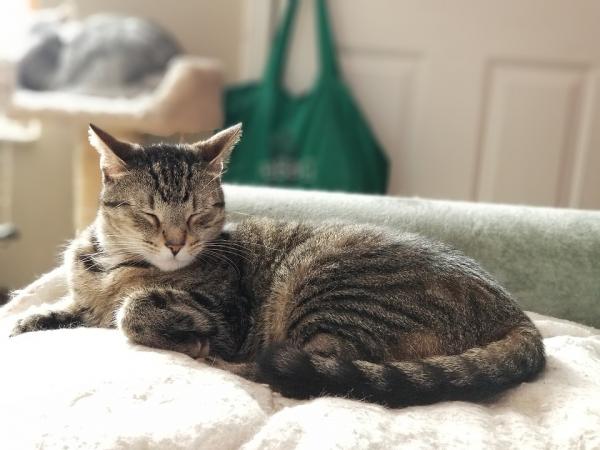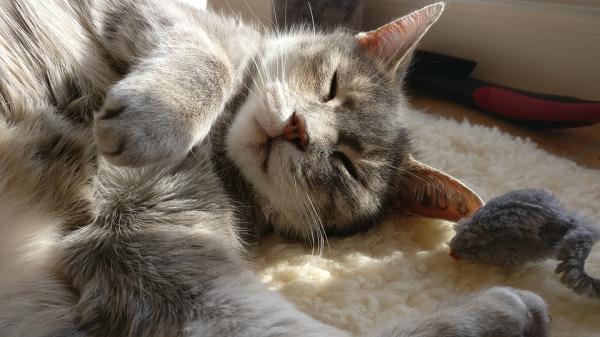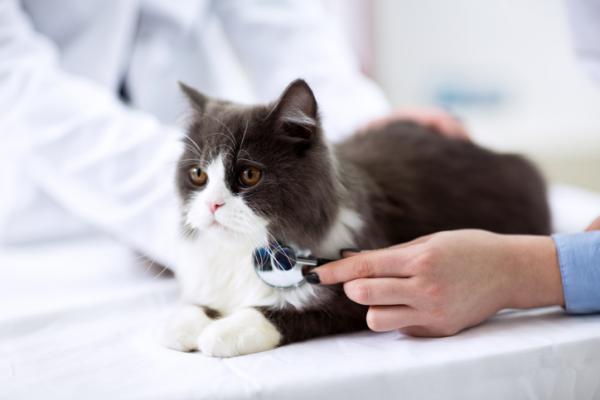Why does my cat sound his guts?

The noises that the digestive system generates in its habitual transit are called borborygms. They are completely normal sounds but if they sound excessively strong and frequent and, above all, are accompanied by other symptoms such as diarrhea, pain, efforts to defecate or vomiting will require a visit to the veterinarian.
In this article, we are going to explain why a cat’s guts ring, the most probable causes and their possible solutions. Do you want to know why your cat has bowed your guts? Discover it!
The digestive activity
In normal digestive activity, as we have said, noise is produced as a result of gastrointestinal movements and the gases. After eat It is normal that, if we put the ear to the belly of our cat, listen to some soft borborygms.
These noises also occur in the opposite case, that is, when the stomach is empty. What sounds then is the gas, although it is difficult to find ourselves in this situation since it is normal for our cat to have food at its disposal at home, so it is rare for it to spend hours with the empty stomach.
These borborygms can be stronger if you have coincided with the cat has swallowed too much air when eating, for example if we offer you some food that excites you and eats it with anxiety. It should be solved by giving the food in smaller and frequent portions.
Out of this normality, if the borborigmos of our cat are very strong, continuous and, in addition, presents another symptomatology we can think of certain alterations that explain why our kitten sounds the gut. We will see them in the following sections.

Parasites
Sometimes, considerable borborygms may indicate the presence of internal parasites. Parasites like coccidia or giardias they will also cause diarrhea. Although in healthy adult cats the parasites do not usually represent a problem, in animals already sick, very old or very small they can be serious, because a profuse diarrhea in these cases can lead to a rapid dehydration.
Therefore, if your kitten is ruined by your guts, you should inform your veterinarian, even if you have already dewormed it. Your kitten has been able to re-infest or the product that has been administered has not covered the parasites that it has. In addition, it is not always easy to identify what it is and it may be necessary to take several stool samples and different days. Before giving our cat with borborygm and diarrhea some dewormer we should consult with our veterinarian because if the symptoms are not produced by parasitic parasites it can be counterproductive.
Disorders of the digestive transit
In this section we will cover the different causes that can hinder digestion and, for this reason, explain why our cats sound their guts. They are the following:
- Foreign body: although it is a more common problem in dogs, cats can also swallow objects, especially threads or cords, that hinder their intestinal transit and, consequently, produce borborygms but also obstructions, injuries or even perforations. Therefore, if our cat, in addition to roaring guts presents vomiting or lack of appetite, we must go to our veterinarian.
- Malabsorption or poor digestion: there are several causes that can affect the digestive system and prevent it from absorbing the nutrients contained in the food in an effective way. In addition to borborigmos, our cat, even fed with quality feed, may present an increase in food intake, gas or weight loss, among other symptoms. It is a situation that will also require veterinary assistance. It usually occurs due to pancreatic problems.
- Indigestion: although it is more common in dogs, cats can also be embarrassed, especially if the animal has access to a food that he especially likes or it is a cat that we collect undernourished and eat too much at one time. We will hear bowel sounds after this excessive intake and these should subside in a few hours. If they continue or other symptoms occur we should consult with our veterinarian. Borborygms can also occur if we suddenly change our cat’s food.
- Dysbiosis: we can explain it as an alteration of the normal flora of our cat’s digestive system. The break of the balance of this microbiota may be the explanation why our cat’s guts roar. If this balance is not restored, we should consult with our veterinarian.
As we can see, if our cat’s bowels sound at a specific moment, which is usually going to be before or after eating, it will not be a cause for concern and will send itself in a few hours. On the contrary, if the borborygms are accompany vomiting, diarrhea or any other sign of discomfort we should go to the vet.
Inflammatory bowel disease
When our cat has frequent bowel sounds that also extend over time and are accompanied by other symptoms such as decomposition, vomiting or weight loss we can think that he suffers from some intestinal pathology, such as inflammatory disease, more common in cats Adults.
Sometimes the symptoms are mild and nonspecific, not being very easy to diagnose, for which endoscopy and biopsy can be used, which serves to differentiate this disease from the intestinal lymphoma. In this case, the inflammatory disease explains why our cats sound their guts. As we can see, although bowel sounds do not usually indicate pathology, we must pay attention to them, especially when they last and the cat shows other symptoms.

This article is merely informative, in .com we do not have the faculty to prescribe veterinary treatments or make any kind of diagnosis. We invite you to take your pet to the veterinarian in case of any type of condition or discomfort.
If you want to read more articles similar to Why does my cat sound his guts?, we recommend that you enter in our section of intestinal problems.


